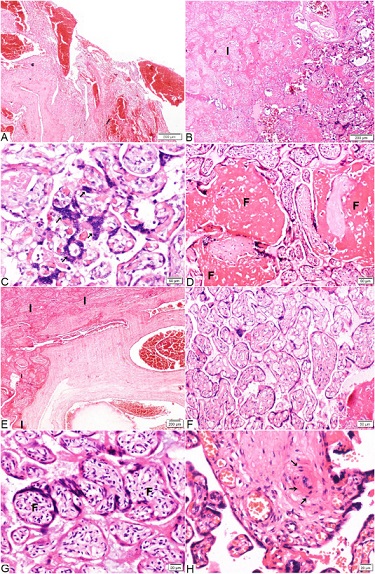Breaking! Study Alarmingly Finds That Up To 49 Percent Of Pregnant Women Infected With COVID-19 Will Have Abnormal Placenta Pathologies!
Source: Medical News - COVID-19 And Pregnancies Aug 08, 2022 3 years, 4 months, 2 weeks, 1 day, 17 hours, 55 minutes ago
In the first 15 months of the COVID-19 pandemic, we have so many ‘garbage’ Western researchers, physicians and so called ‘experts’ from the United Kingdom and United States claiming that infections with SARS-CoV-2 virus does not affect pregnant women or their unborn babies but of late, we are coming across a lot of research data and case reports showing that this is not the least true coupled with the manifestations of a variety of health complications in both mothers and also their babies not to mention the high amount of miscarriages, stillbirths etc.

Unfortunately, many stupid Westerners will still consult these so-called ‘garbage’ ‘medical experts’, many of which can be found on twitter with regards to any new medical articles and research findings. It’s a little wonder that the United Kingdom and the United States are the worst infected countries in the world not only in terms of infection caseloads, but also in terms of COVID-19 deaths, excess deaths and also Long COVID and now even monkeypox and other emerging diseases and it will continue to be the case due to the stupidity of the masses in trusting ‘garbage’ experts!
A new study by researchers from the Postgraduate Institute of Medical Education and Research (PGIMNER) at Chandigarh, India has alarmingly found that the incidence of of abnormal placental pathologies in COVID-19 infected mothers is 49.16%!
The study also found that maternal vascular malperfusion (MVM) is the most observed placental morphologic abnormality and also a higher incidence of silent antepartum is found in COVID-19 infected mothers.
The study aimed at observing placental pathologies in COVID-19 infected women, and analyzing its impact on pregnancy outcome.
The descriptive-analytical study was conducted at a tertiary center of Northern India. All COVID-19 positive pregnant women with gestational age ≥20 weeks, with placental histopathological reporting, were included in this study. A total of 173 COVID-19 pregnant women were included in the study.
Alarmingly, placental abnormalities were noticed in 49·16% of total 179 placentae examined. Maternal vascular malperfusion (27·93%) was the most observed placental pathology followed by villous fibrin deposits (22·90%), fetal vasculopathy (16·75%), and acute inflammation (6·70%). Stillbirths were 22 and NICU admissions were seen in 50 neonates.
The study found that the abnormal placental abnormalities led to higher stillbirths (p value 0·011) and lower Apgar scores at 1 and 5 min (p-value 0·028; p-value 0·002, respectively). Intervillous fibrin deposits had higher risk associated with lower Apgar score at 1 and 5 min [RR 2·05 (95% CI 1·21–3·48, p-value 0·010) and RR 5·52 (95% CI 2·58–11·81, p-value <0·001), respectively]. RP clot/hemorrhage was also associated with lower Apgar score at 1 and 5 min [RR 2·61 (95% CI 1·52–4·49, p-value 0·002) and RR 3.54 (95% CI 1·66–7·55, p-value 0·001), respectively].
The study findings showed that placental abnormalities in COVID-19 infection were associated with significant higher incidence of unexplained stillbirths, and lower Apgar
scores. Although, this is the largest descriptive-analytical study done so far, comparative studies are required to draw a clear conclusion regarding the impact of COVID-19 infection on human placenta and its effect on pregnancy outcomes.
The study findings were published in the peer reviewed journal: Placenta (Science Direct).
https://www.sciencedirect.com/science/article/pii/S0143400422003083
The current COVID-19 pandemic, which is caused by the severe acute respiratory syndrome coronavirus 2 (SARS-CoV-2), has significantly affected the global healthcare sector and economy. To date, SARS-CoV-2 has infected over 589.6 million and claimed more than 6.43 million lives worldwide. (real figures could be as high as 6 to 7-fold!)
Scientists have worked at an unprecedented speed to analyze various aspects of COVID-19 in an effort to design effective pharmaceutical and non-pharmaceutical measures to protect individuals from this disease.
Typically, pregnancy induces an immunocompromised state in the mother, thereby making her more vulnerable to viral respiratory infections.
Past research and studies have revealed that the placenta, which provides nutrients to the fetus, exhibits an attenuated immune response and hosts many viral infections.
Importantly, certain maternal conditions that might affect pregnancy outcomes include inflammatory activation, hypoxia, and increased thrombotic events secondary to COVID-19.
Though the placental features in COVID-19 have been described, there remains a lack of evidence regarding the characteristic pathological outcomes associated with placental pathologies resulting from COVID-19.
Corresponding author, Dr Vanita Suri from the Department of Obstetrics and Gynecology at PGIMER told Thailand
Medical News, “This is the first study to date that describes the impact of placental morphological changes in COVID-19 on pregnancy outcomes.”
The study was conducted between July 1, 2020, and June 30, 2021. Pregnant women with COVID-19 who delivered at PGIMER were included in the study.
All the pregnant women tested positive for COVID-19 as confirmed by reverse transcription-polymerase chain reaction (RT-PCR) assay or GeneXpert Dx Xpress SARSCoV-2 RT-PCR assay. Only women who delivered at more than 20 weeks of gestation were included in the study cohort.
Important data such as demographic characteristics, mode of delivery, COVID-19 severity, obstetrical complications, maternal mortality, and neonatal details of selected candidates were assessed.
In all, a total of 179 placentae obtained from 170 participants were analyzed in the current study.
 Placental abnormalities seen in COVID-19 positive women. A, Retroplacental clot; B, Infarction
Placental abnormalities seen in COVID-19 positive women. A, Retroplacental clot; B, Infarction
(area marked by letter I); C, increased syncytial knots (arrows); D, increased perivillous fibrin deposition (area marked by letter F); E, Maternal floor infarction (area marked by letter I); F, chorangiosis; G, Villous fibrosis; H, Vascular occlusion seen in stem villous (arrows). (Haematoxylin-Eosin stain, o.m. A, B, E x100; C, D, F x200; G, H x400).
Shockingly, over 49% of placentae exhibited at least one abnormal feature based on histopathological examination (HPE).
Almost 28% exhibited maternal vascular malformation, which was followed by villous fibrin deposition, fetal vasculopathy, and acute inflammation at rates of about 23%, 17%, and 7%, respectively.
These study findings are consistent with previous reports that revealed the majority of placental abnormalities were linked with fetal vasculopathy, followed by villitis, intervillositis, and chorioamnionitis.
However, the presence of placental abnormalities was not related to COVID-19 severity.
Contrary to previous studies, the risk of preeclampsia or clinically detected abruptio placentae was not elevated in mothers with abnormal placental pathologies.
Concerningly, placental morphologic examination revealed an elevated incidence of retroplacental (RP) clots/hemorrhages. This might be due to silent antepartum hemorrhages caused by COVID-19.
The study team also compared pregnancy outcomes between COVID-19-positive mothers with abnormal placental morphology and COVID-19-positive mothers with normal placental morphology.
The study findings showed an increased risk of stillbirths in COVID-19 mothers with abnormal placentae. These stillbirths were clinically unexplained, as clinicians did not observe the incidence of pre-eclampsia, fetal growth restriction (FGR), intrahepatic cholestasis of pregnancy (ICP), or abruptio placentae.
Furthermore, infants born to SARS-CoV-2-infected mothers with abnormal placental morphologic features exhibited significantly lower Apgar scores at one minute and five minutes, which indicates the overall health of a newborn. However, lower Apgar scores did not affect NICU admissions.
A significant correlation was observed between RP clot/hemorrhage and intervillous fibrin deposition at lower Apgar scores.
The stud team said that a systematic enhancement in thrombotic events and microvascular injury syndrome as a result of COVID-19 might affect the placenta. This could lead to rapid or slow blood flow, decreased fibrinolysis, elevated levels of fibrin degradation products, and increased hypoxic-ischemic injury.
The study team concluded that 50% of the study participants’ placentae exhibited abnormal morphologic features. Furthermore, pregnant women with COVID-19 and abnormal placental morphologies were associated with poor pregnancy outcomes.
This study is likely the first to correlate placental morphological features in COVID-19-positive pregnant women with pregnancy outcomes. A key strength of this study is its large cohort.
However, one of the key limitations is that the study findings were not compared with non-COVID-19 controls. As a result, the scientists failed to confirm that all placental changes and pregnancy outcomes were solely related to COVID-19 rather than any other factors.
The study team said that more research is needed to elucidate the effect of the SARS-CoV-2 burden on the extent of the placental injury.
For more on how COVID-19 affects pregnancies, keep on logging to Thailand Medical News.

